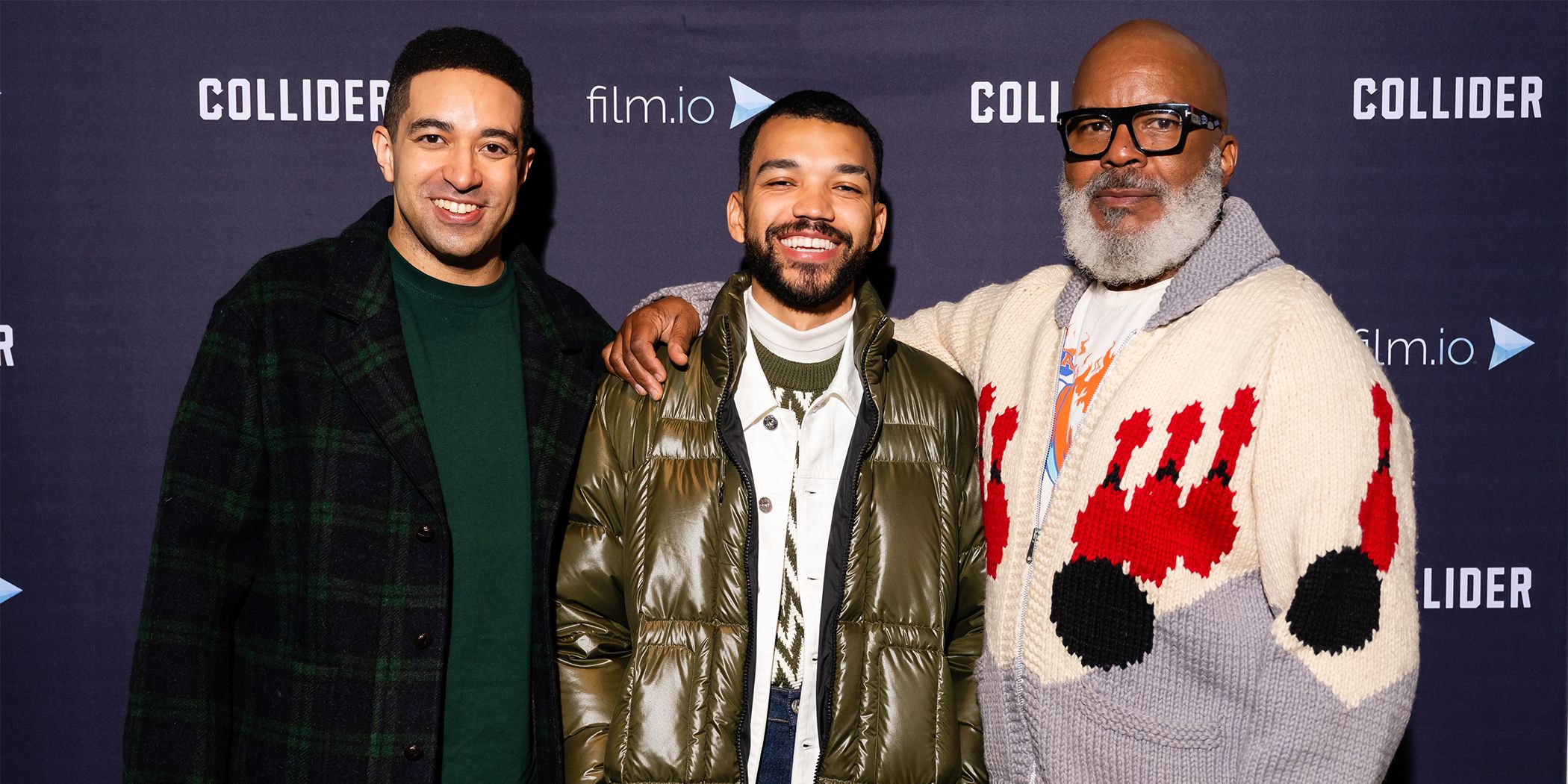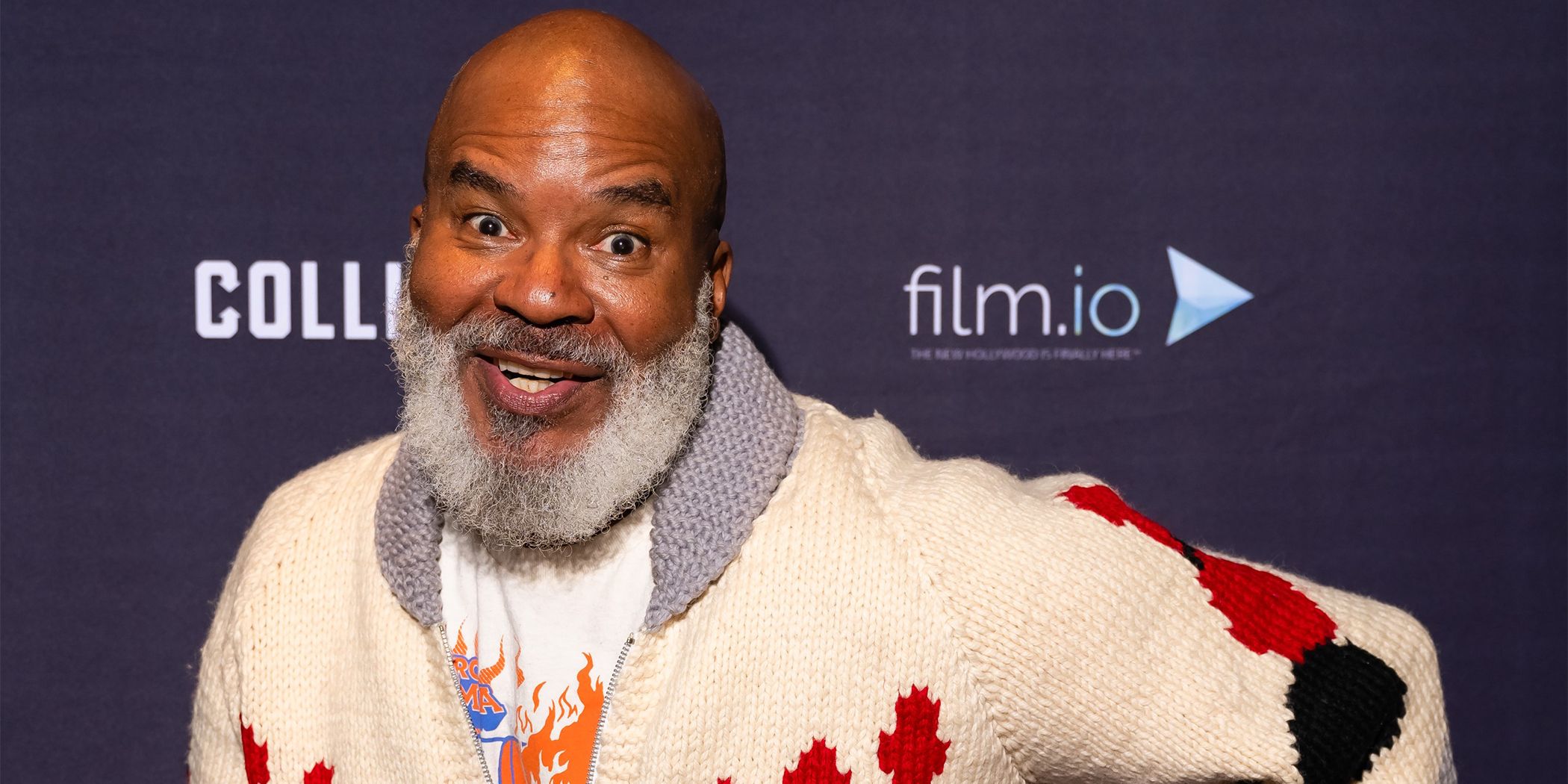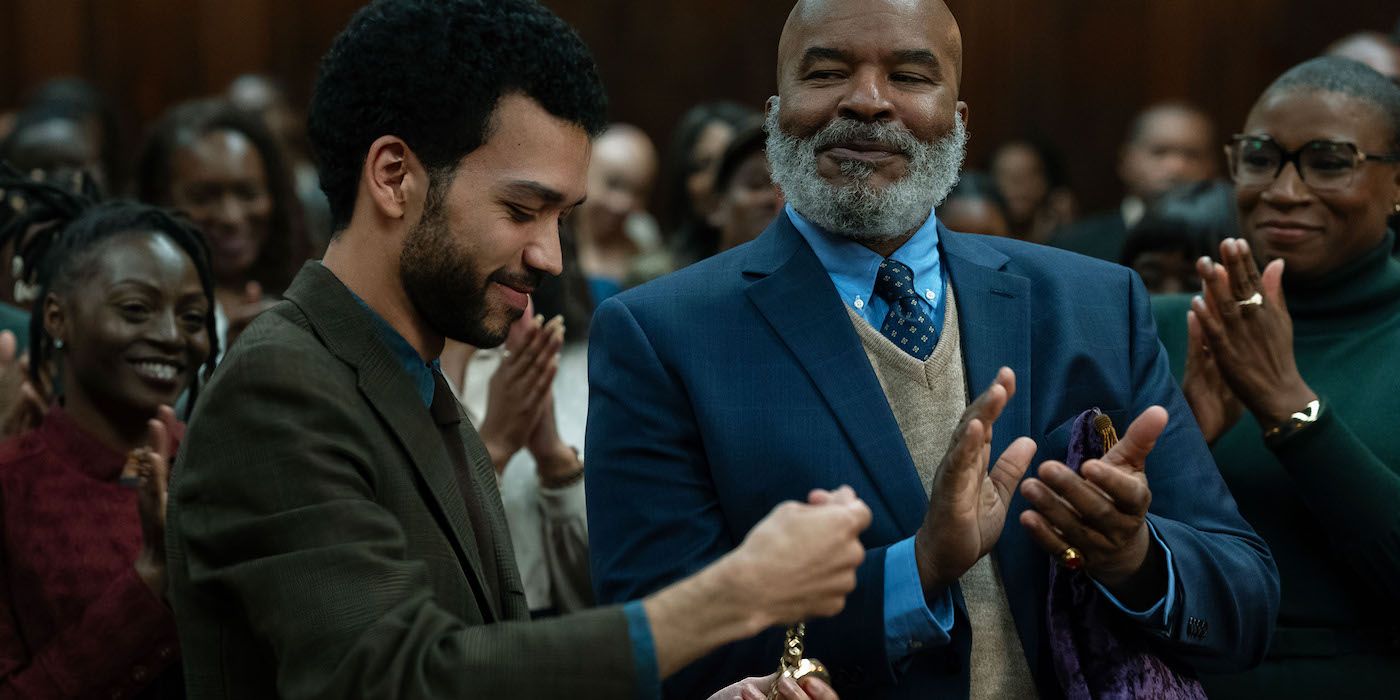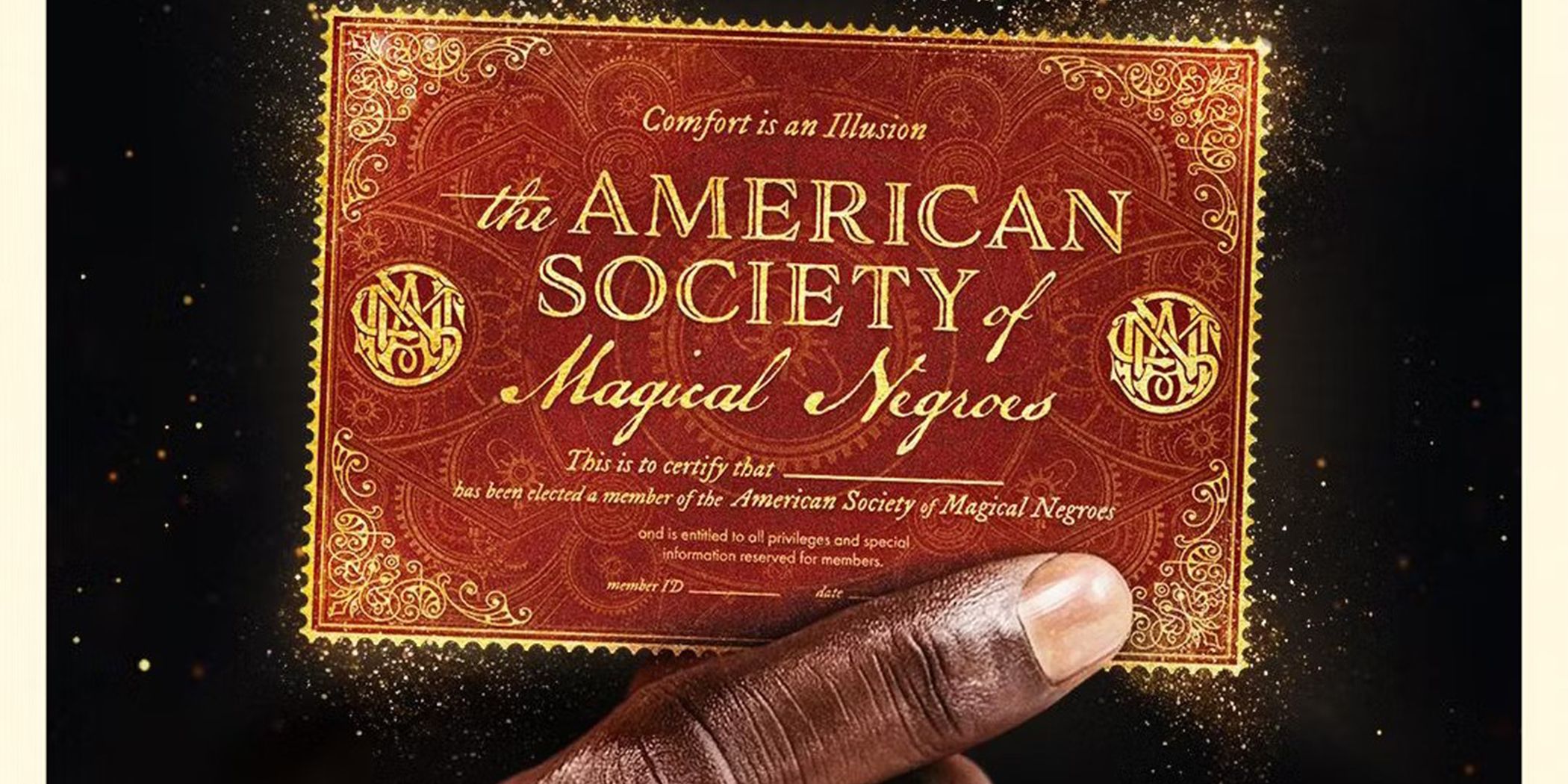The Big Picture
- Collider’s Perri Nemiroff sits down with the team behind The American Society of Magical Negroes at the 2024 Sundance Film Festival.
- Writer-director Kobi Libii and stars Justice Smith and David Alan Grier discuss making the upcoming Focus Features release.
- The movie focuses on Smith’s character, Aren, who is recruited into “a secret society of magical Black people who dedicate their lives to a cause of utmost importance: making white people’s lives easier.”
After workshopping the script at the Sundance Labs, writer-director Kobi Libii just brought his finished product to the festival. Set to be released by Focus Features, The American Society of Magical Negroes just celebrated its world premiere screening at the 2024 Sundance Film Festival.
Marking his feature directorial debut, in The American Society of Magical Negroes, Libii puts the spotlight on Justice Smith‘s character, Aren. As explained in the film’s official synopsis, he’s “recruited into a secret society of magical Black people who dedicate their lives to a cause of utmost importance: making white people more comfortable.” For a period of time, Aren is in awe of the powers he gains by joining the Society, but he soon comes to question the organization as he realizes it requires him to use these supernatural abilities to do something he’s felt pressured to do his entire life.
While in Park City for the film’s premiere screening, Libii, Smith and David Alan Grier who plays Roger in the movie, Aren’s mentor in the Society, visited the Collider interview studio brought to you by Film.io to revisit their experience bringing Libii’s vision from script to screen. Smith recalled finding a particular “issue” with his character while participating in the Sundance Labs, Libii pinpointed his break story moment with the concept, and Grier explained why he didn’t feel any need to improvise on set. Hear about that and loads more in the video interview at the top of this article, or in the transcript below.
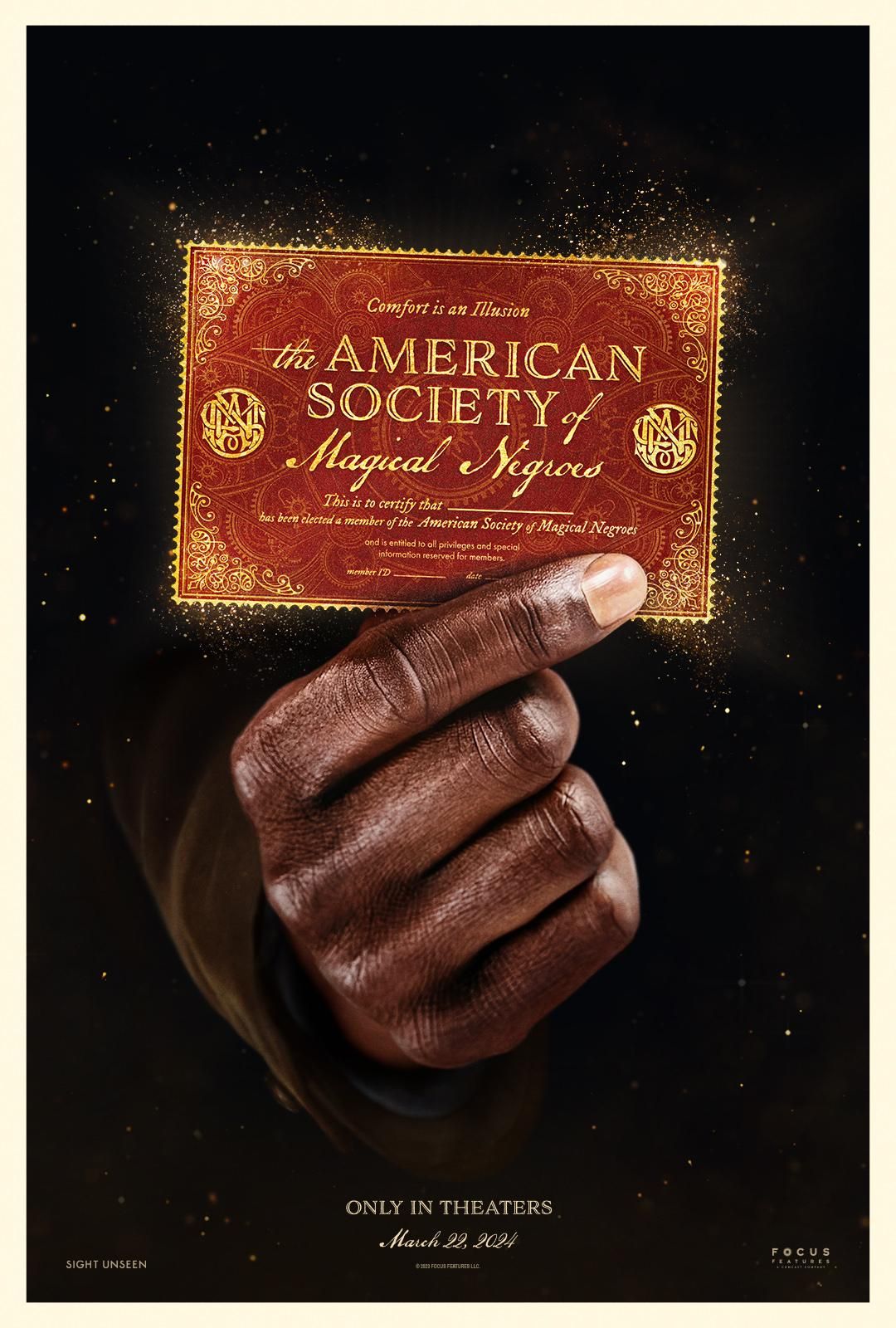
The American Society of Magical Negroes
Aren is recruited into a secret society of magical Black people who dedicate their lives to a cause of utmost importance.
- Release Date
- March 22, 2024
- Director
- Kobi Libii
- Runtime
- 104 minutes
- Main Genre
- Comedy
- Writers
- Kobi Libii
PERRI NEMIROFF: Kobi, what was the first idea, the core idea that started it all? But then also, did you have a break story moment, something that made you think, ‘This high concept will be a full feature film now?’
KOBI LIBII: I started this project with just the premise of a magical negro society. When I first started working on it, I thought it was gonna be a much shorter piece. I didn’t think it was gonna be a feature because most high concept comedic ideas should be about two minutes long, generously. [Laughs] In terms of a break story moment, it came really early when I realized I was writing about something much bigger, that I wasn’t just critiquing this particular toxic film trope, but I was really writing about my own experience growing up as a Black person in America and writing about defense mechanisms that I had been taught to respond to racism. The film ended up being a space for me to process that and hopefully help other people do the same.
I’m sure you go into filming with a rock-solid script, but I love hearing about how films can evolve every single step of the way. What would you say is the biggest difference between draft one of this screenplay and what everyone will now see in the finished feature?
LIBII: Oh gosh.
JUSTICE SMITH: The protagonist’s name changed.
What was the name?
SMITH: His name was Omar, originally.
DAVID ALAN GRIER: That was your name?
SMITH: Yeah, Omar. Wait, was that the name?
LIBII: It was. It was in the original draft.
SMITH: But then what was the joke of the switch?
LIBII: There’s a cut joke that was a wordplay joke on the old name, and I think one of your biggest concerns when we changed the name was that that wordplay joke wasn’t gonna work.
SMITH: I know.
LIBII: But we found a new one. We solved it.
SMITH: We found a new one, but then they both got cut.
LIBII: Then we cut the scene anyway.
GRIER: What was the old joke?
SMITH: The joke was someone didn’t understand my …
GRIER: What was the old joke, Kobi?
SMITH: I’m explaining it. [Laughs]
GRIER: … Kobi, the director?
LIBII: Let me just say this, it was cut for a reason.
GRIER: No, just tell us. Open your world up to us.
LIBII: Alright, here’s a joke that didn’t make the film. No, no, I mean there are a million …
GRIER: What was the joke?
SMITH: David! No! [Laughs]
GRIER: This is a journalist tactic. You repeat the question until it’s answered.
[Laughs] I will never do this, so I’m glad you’re doing it for me.
GRIER: What’s the joke? What was the joke?
SMITH: It’s not a funny joke to recount. It’s only funny in context.
LIBII: It was quite funny in the scene. It doesn’t work here.
GRIER: You should do stand-up.
Justice Smith Helped Shape His Character in ‘American Society of Magical Negroes’
LIBII: I think always the biggest change from the script to the finished film is just all of the texture that the individual actors bring to it. I try to be very collaborative, in part because it’s just my sensibility, but also because when you’re working with artists of this caliber, they really do have meaningful stuff to contribute. Sometimes that’s literal language, “Oh, I feel like my character might say this instead of that.” But other times it’s just texture, you know, the integrity that David brings to the society sort of tells all the other actors, “Oh, okay, this is how we’re approaching this,” where the seriousness of purpose Justice brings to it tells other actor, “Oh, this is not broad. We’re playing it in this pocket over here.” That stuff really helps refine it.
SMITH: I remember specifically Kobi and I, because I wouldn’t say I signed on to this, but I became a part of this at the Sundance Labs. Kobi invited me to workshop the script with him, not as a writer, but as an actor. I remember the biggest issue for me with the character was his relationship to magic, the realization that magic exists. In order for our audience to be connected to this protagonist, he has to have some reckoning with this supernatural thing actually exists before we get into the larger metaphor and the journey of the character. So, I know that we were really playing around with that — how astonished he is, how taken aback, how in denial he is that this is real. That was important to pepper in, but still driving the narrative. We didn’t harp on this thing, because we don’t want to see a character, like, the whole movie just be like, “Oh my god, magic is real!” Because then we’re just like, “Get over it.” [Laughs]
LIBII: It’s one of those really great collaborations, I think, between the different chairs we sit in where, as a filmmaker, it’s so easy to be like, “Everyone knows it’s a magical premise. It’s a secret society. We accept it pretty quickly. We don’t need to spend a lot of time adjusting to that reality because everybody knows that premise walking in.” But then as an actor, Justice’s point is like, “This is insane. I’ve been sucked into a magic society. Can we take a minute and respect that?”
GRIER: You know what, though? I never mentioned this to you, but because Kobi was a first-time director, we got to certain parts and he said, “Oh, but this is what I wrote. Feel free to improvise.” I did sense — I never addressed it because I just thought it would make it more awkward — that if you are overthinking what you wrote, commenting on it, then I wanted to reassure you, “It’s well written. I don’t have to rewrite it. I don’t have to improvise.” And it was. So I really did not, in those instances, take him up on it because I didn’t think it was needed.
Kobi Libii Set a New Director Benchmark for Justice Smith
Bringing up that it’s his first feature, what is something about Kobi as an actor’s director and a leader that you really appreciated on this set that you’re excited for more actors to get to experience in the future?
SMITH: Oh my god, so much. He is now the reference point for how all directors need to be on set, for me, anyways. He set the precedent. Because he is an actor, he’s come from that world …
GRIER: Well, he thinks he’s an actor.
SMITH: He tried to be an actor … [Laughs] No, he understands what the actor’s process is. He understands that while it’s his job to worry about the image and the technical nature of the film, it’s our job to worry about the psychology, so he’s only talking to us about character. But at the same time, this man’s leadership is phenomenal, because he makes every department feel heard and seen while still holding on to his true vision, which is so hard to balance.
GRIER: Yeah, but it was kind … I thought it was obnoxious. Because Kobi, he wanted to let you know he knew everyone’s name. “Hey Jinx, Smokes, and Bingo, come on guys! Let’s check our sound.” I would tease him, though. I would say, “Oh, Mr. First-Time Director, why don’t you direct me? You don’t know what the fuck you’re doing.” [Laughs] You know, stuff like that to make it fun, and abusive, so it was cool.
The Set of ‘American Society of Magical Negroes’ Reflected the Film’s Message
Kobi, what is the key for you to creating an environment like that on set, an environment where everybody feels seen and like their input is valued, but while you never lose control of your personal creative vision for the film?
LIBII: In many ways, it’s a film about people who aren’t always seen being seen. It’s a film about background characters stepping forward and having their moment in the sun, Black characters who might have been sidelined being allowed to come forward and have their moment. If you’re telling a story like that and it’s consistent with your values, it’s weird if you’re shitty to a PA, you know what I’m saying? That doesn’t really make sense, right? So, beyond it just being a reflection of my values, it is quite selfish about the work because I do have, obviously, a really clear vision for what the film is and what the texture of it is and what the performances are in many cases, and what all the shots look like in many cases, but it’s processing the way you get to that. To me, what I’m always trying to do is make people freer to do great work.
SMITH: So on another movie where it’s not that message, you’re gonna be an asshole and be mean to everyone?
LIBII: Oh yeah. 100%. This is just specific to this piece. I’m gonna be a monster later. [Laughs] But I did start my career as an actor, and so I’ve been on a lot of sets. On certain sets you watch people shrink and you watch people get smaller because of the leadership and because of the texture. To me, you just want people to get bigger and more expansive and braver because no matter how clear a vision I have for it, one of my favorite things is when someone beats my idea. When I have a way I think this particular scene should go, but then Justice will be like, “What if we try it this way?” And the real tragedy is when the Justices of the world stop saying, “Well, what if we try it this way?” Because you just might miss the best version of a scene.
SMITH: What Kobi does so well is that he organizes what’s gonna happen during the shoot. He’s so well organized, and he allots time for experimentation. So every single department, when they have an idea and he sees a route of it, he sees value in it, he’s gonna try it. He’s gonna experiment with it. Sometimes it doesn’t work, but sometimes, it’s like what he says, it beats his original idea. I think when you have someone who is so open to trying things and experimenting, you don’t feel as bad if it doesn’t work out in the end, if it gets cut or whatever, because you feel respected, because you feel like you were hired for a reason, because you’re trusted as an artist. And that’s why it was one of the most well oiled films I’ve ever been on.
GRIER: Oiled?
SMITH: Like a well-oiled machine.
GRIER: I’m thinking. I wasn’t … sorry. I have Tourettes. Stop.
SMITH: [Laughs] I don’t even know what I was saying!
GRIER: Oh, it worked! Anyway …
It was a well-oiled machine.
SMITH: It was a well-oiled machine!
GRIER: But why is it so sexual? “It was oiled and massaged.”
SMITH: It was lubricated.
GRIER: “And when he was aroused, intellectually, he helped us achieve our climactic acting moments, if you know what I mean.”
I mean, filmmaking is sexy. I get it.
GRIER: [Laughs] It ain’t that sexy! But I have been on hostile sets. Have you?
SMITH: Mhmm.
GRIER: In which it’s run more like a mutinous battleship.
SMITH: Yes.
GRIER: Where literally the crew is either gonna set up the shot or beat your ass, and that’s no fun. That is no fun. That’s when I switch into a survival mode, and just, “Let me do my thing and get out of here as quick as I can.” Which most of the days, that’s really what it was like with boop! [Points at Libii.] I called him Black Stalin if that informs you.
‘American Society of Magical Negroes’ Might Not Have Been Made 3 Years Ago
We’ve been asking a Film.io-inspired question, and I feel like it does lean into a lot of what you’ve been describing. Film.io is a company that’s all about putting creative control in the hands of the creators, which I think is a very important thing that this industry needs more of. Whether it’s on this film or anything else you’ve worked on, can you give me an example of a time when someone gave you creative control when you didn’t expect to get it?
SMITH: On this film. This is the most creative control I’ve had. I’m a control freak and being an actor is not really the job for that because you don’t, at the end of the day, at least being a film actor, you don’t get to control your performance. It’s all in the edit. It’s all in the hands of the director. I remember early in my career, I used to do every take the same way so I had some grasp of, “This is mine. It’s my performance.” And I learned that that ultimately makes the performance stale, and you have to trust your captain. But I had never experienced collaboration like this, and at times I had to check myself because I’m like, “But Kobi, this is your movie …” Because he would often want to hear my ideas about casting and about lines and about story beats. He would give me so much freedom to improvise things and beef up moments, like the LEGO scene. I felt so equal to him, and that’s a dangerous feeling because now I expect so much when I go on film sets.
To be fair, you should expect that of your collaborators.
SMITH: That’s true.
GRIER: It’s not as common as you think.
It’s not common, but it should be.
LIBII: It is shocking.
GRIER: The most autonomy, I would probably In Living Color because Keenen [Ivory Wayans] was, from the beginning, he said, “You can sit in your dressing room and wait for these writers to come up with sketches, but if you’re not being served, write your own stuff. Pitch your own stuff. Come to me with these ideas. That’s how you will get the most from this show.” That’s probably the last time where I really felt that much autonomy. And I personally, as an actor, I don’t like coming in, because I’ve been in that situation where it’s like, “The protagonist gets on an elevator. Enter David, and he’s gonna be funny.” I’m like, “Dude, give me some lines. You know what you do, man, just come up with some stuff!” [Laughs] I want a little structure.
LIBII: For me, I think it’s this piece, too. It’s a piece that is incredibly specific to my experience, and that experience is incredibly Black, and it is very particularly Black. It’s not necessarily the way I’ve processed racism and the way I’ve responded to it, and my particular defense mechanisms in the face of it are not every other Black person’s, and because of that, I think it’s a quite distinct Black film. I have, at various points in my career, as you can imagine, encountered racism in Hollywood. It’s come up. But once I was with these producers at Sight Unseen and this distributor of Focus, they were very supportive about just really listening to me. When I say, “This is what this film is. This is what my experience is,” it was respected in a way that I feel very lucky to live right now. I sometimes play a game with my Black filmmaker friends of, like, “How long ago would this film have not been greenlit? Is it three years? Is it five years? Is it 10 years?” You know what I mean?
SMITH: I think about that all the time. I think about my career and how I wouldn’t have had a career if I was acting in, like, the early 2000s. The roles that I played are so specific to the time periods that they were in. So yeah, I think about that all the time.
The American Society of Magical Negroes is in theaters beginning March 15th.
Special thanks to our 2024 partners at Sundance including presenting partner Film.io and supporting partners Pressed Juicery and DragonFly Coffee Roasters.




